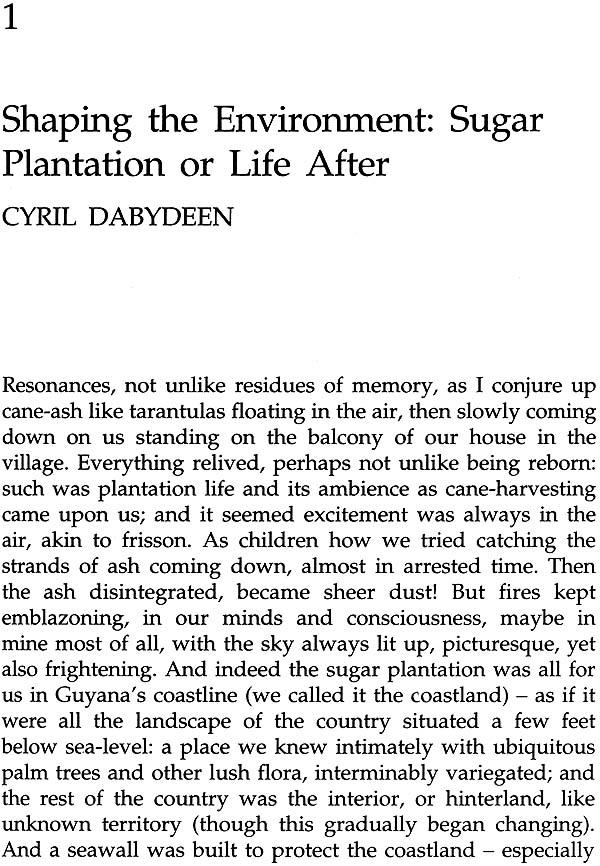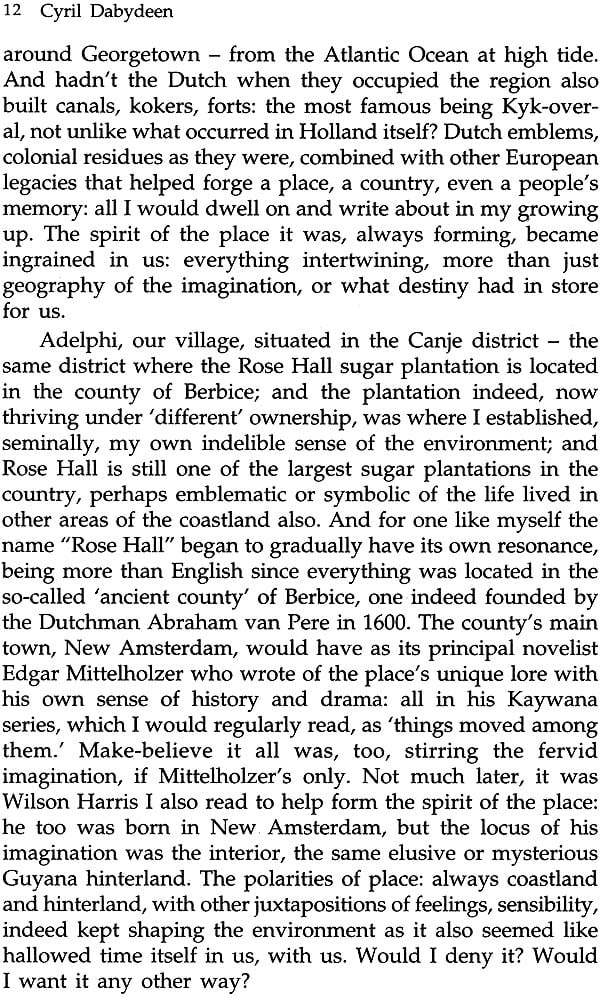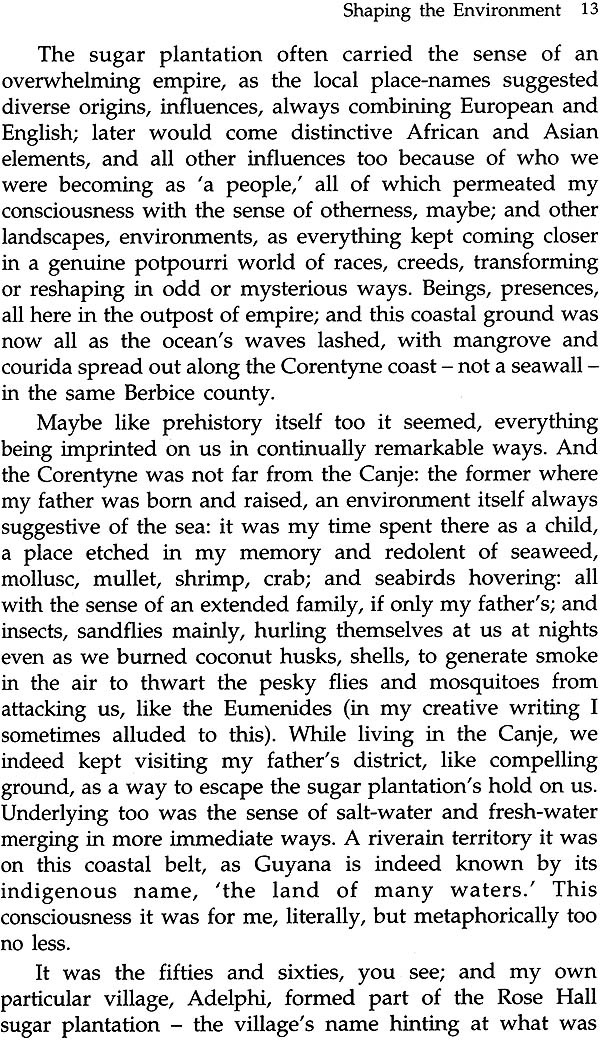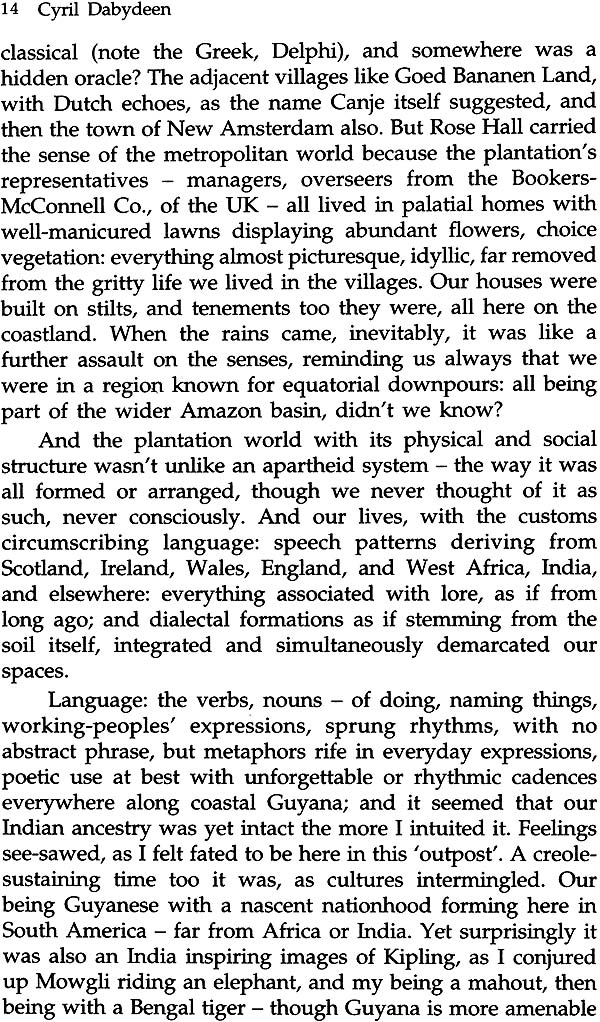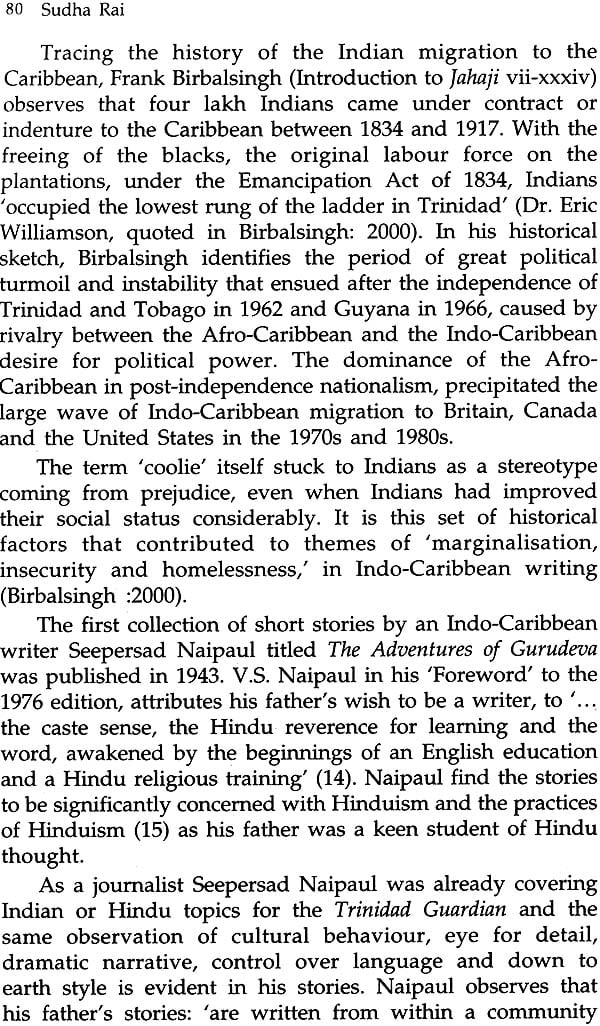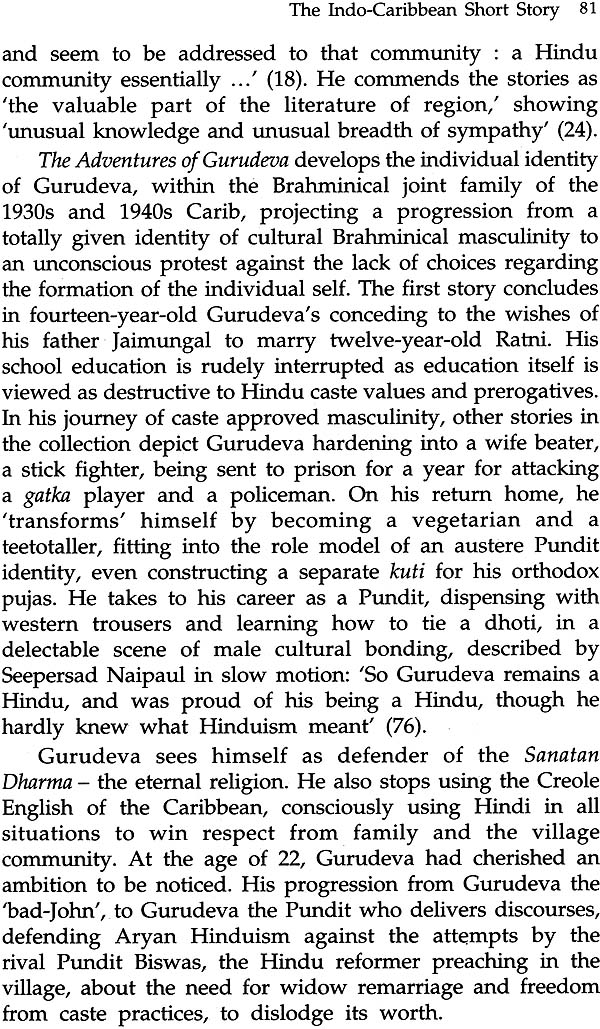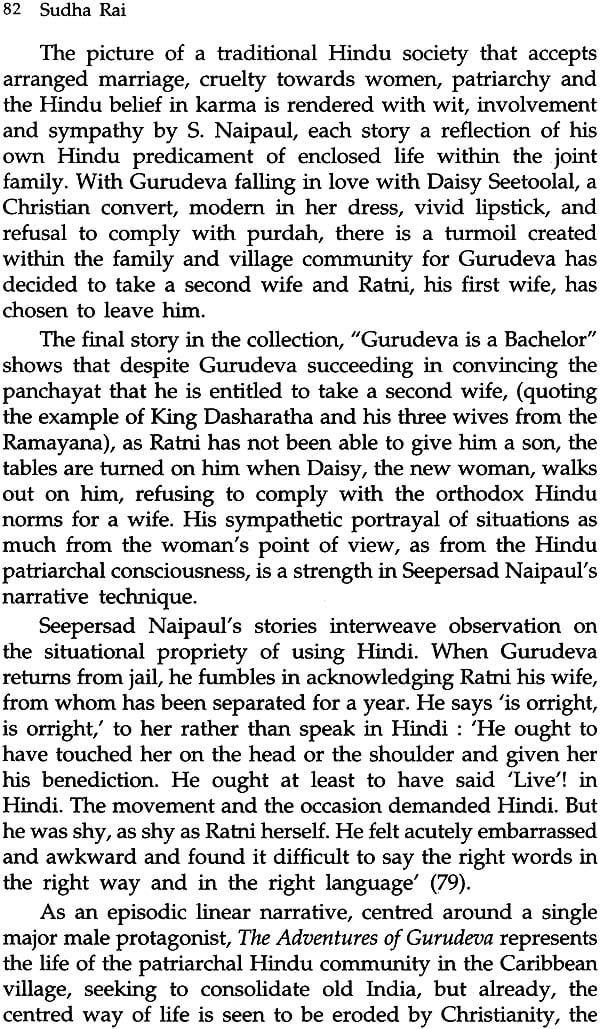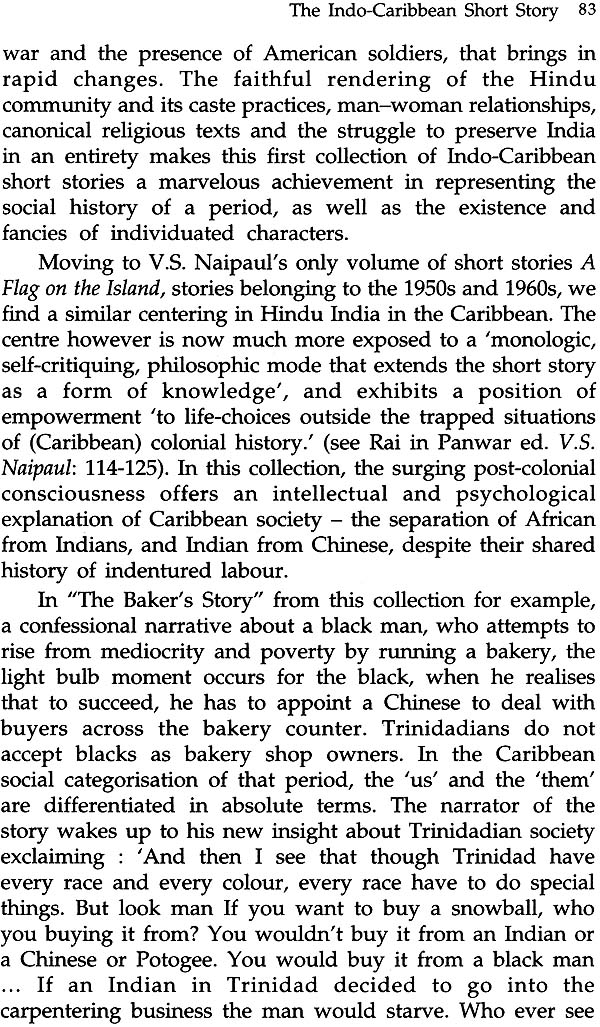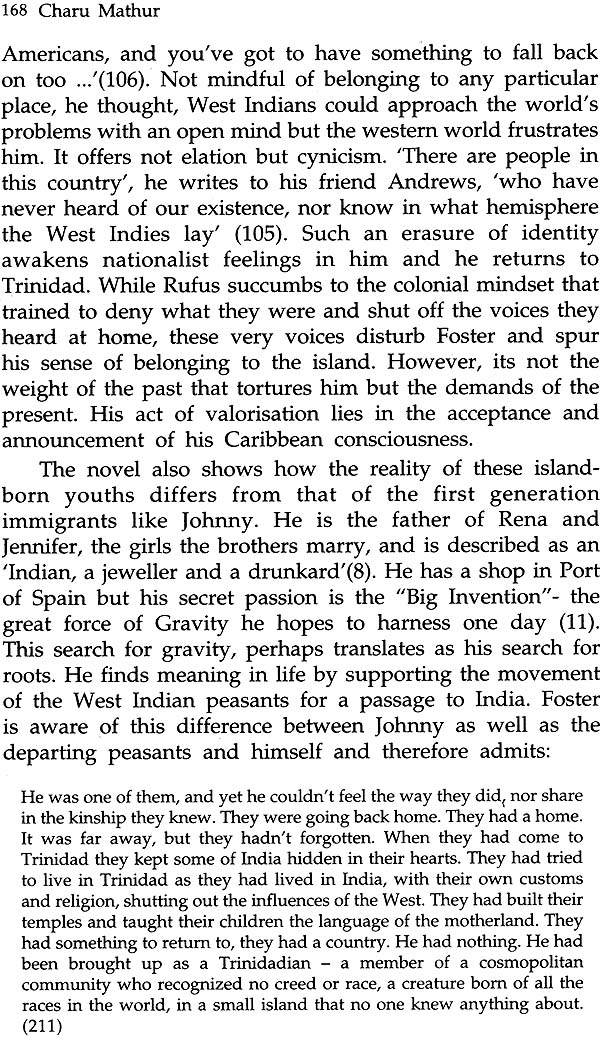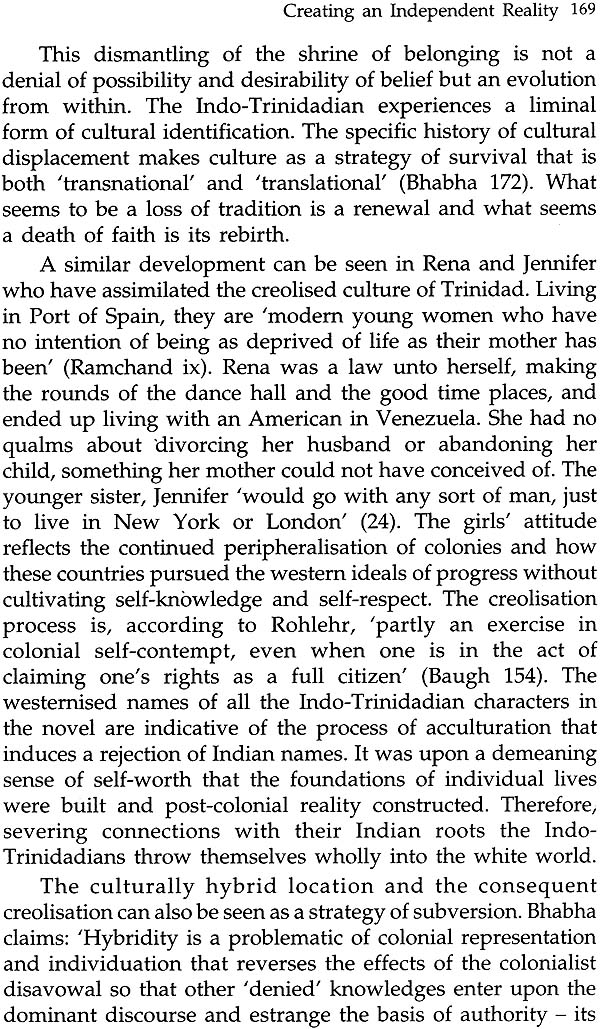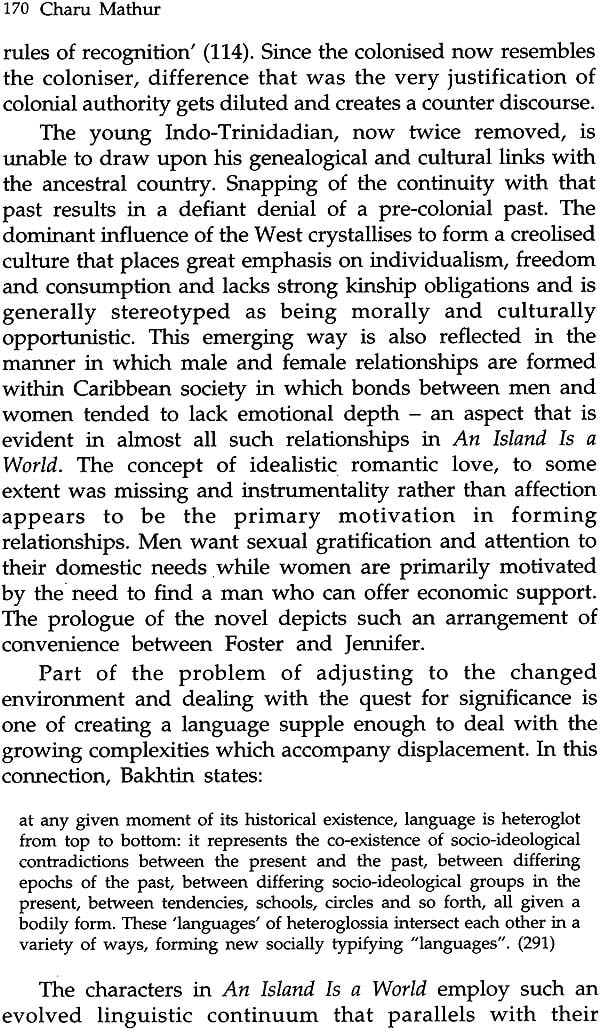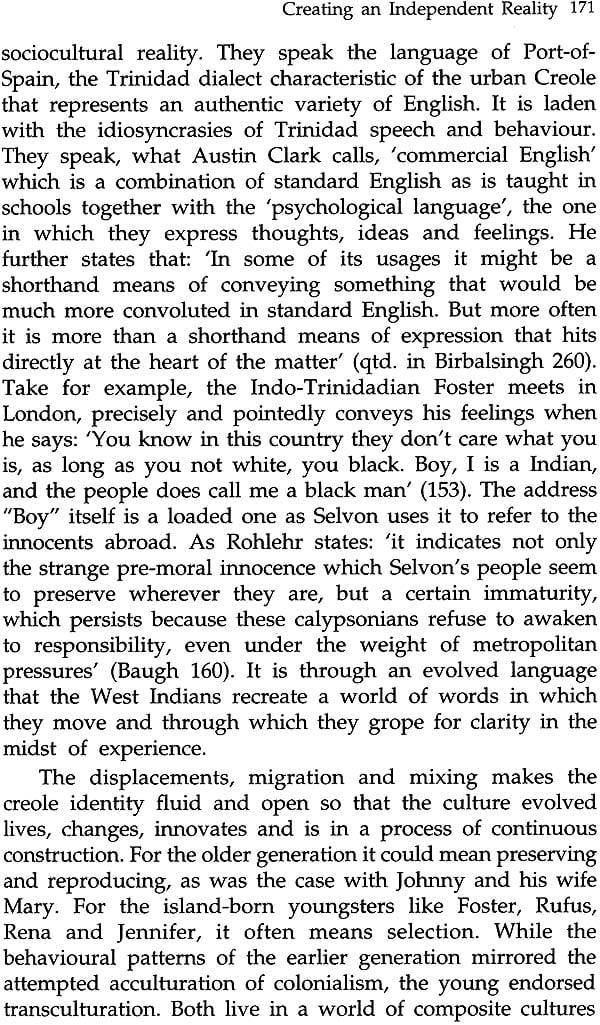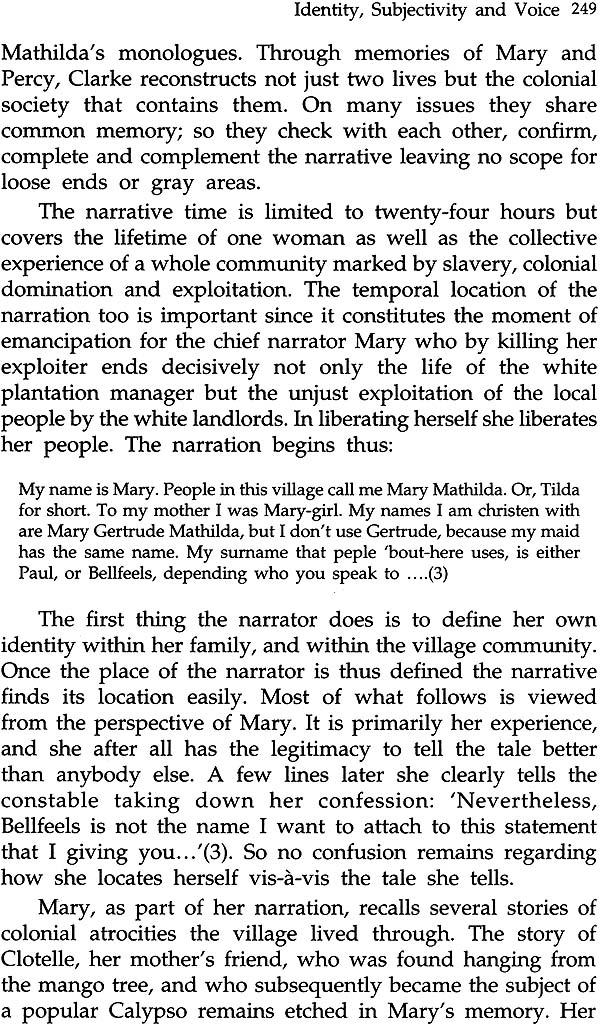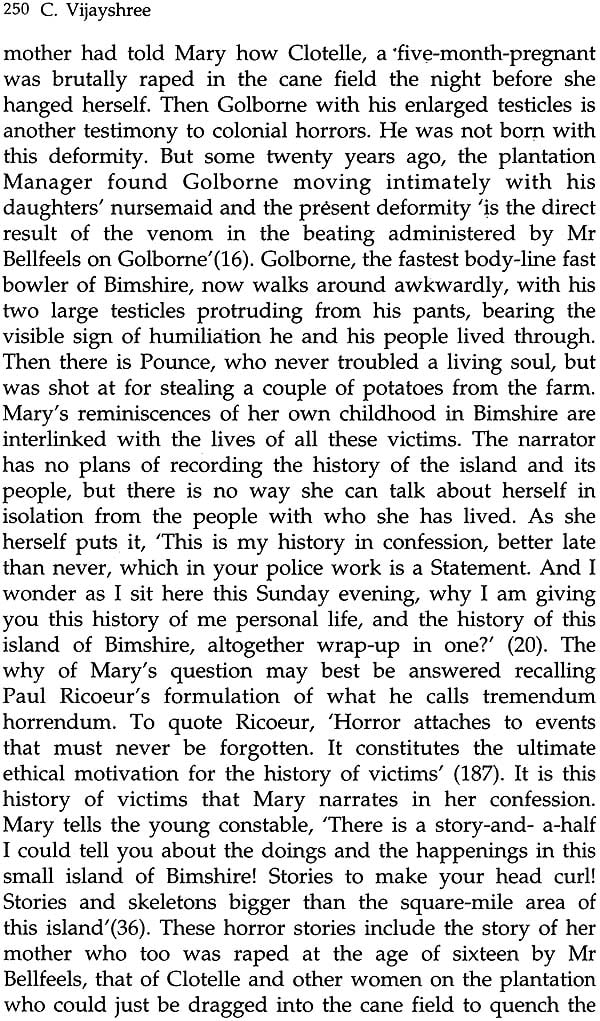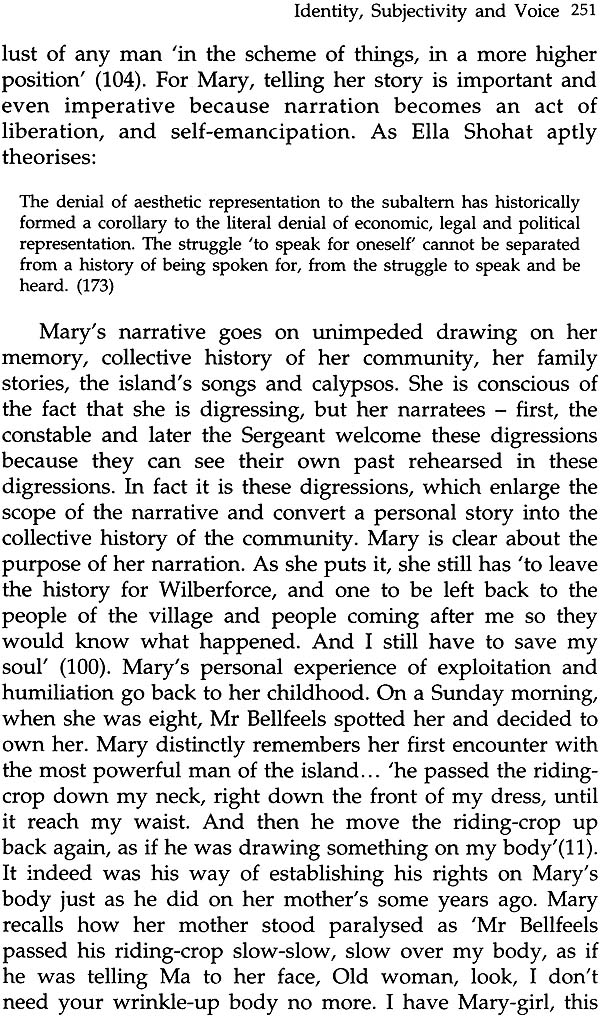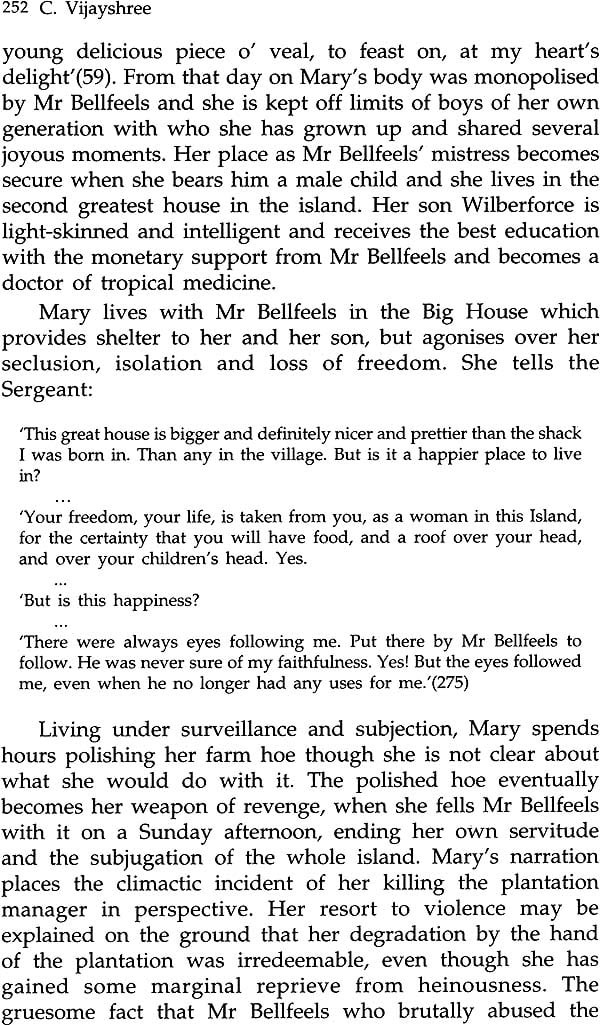
Writers of the Caribbean Diaspora (Shifting Homelands, Travelling Identities)
Book Specification
| Item Code: | NAJ022 |
| Author: | Jasbir Jain and Supriya Aggarwal |
| Publisher: | STERLING PUBLISHERS PVT. LTD. |
| Language: | English |
| Edition: | 2008 |
| ISBN: | 9788120736108 |
| Pages: | 296 |
| Cover: | Paperback |
| Other Details | 8.5 inch x 5.5 inch |
| Weight | 340 gm |
Book Description
About the Book
Histories are important and histories have a way of travelling. West Indies is one example of a society constructed artificially of imported populations, who have gone on to build their own power structures, political histories and national identities. The Caribbean is one such society where multiculruralism has been put to test. This book is an attempt to understand Caribbean histories, patterns of migration and race relations. It is a collection of essays by Caribbean writers like VS. Naipaul, Paule Marshall, Jean Rhys, Austin Clarke, Caryl Phillips and Cyril Dabydeen. The essays in this book have taken up most of the representative authors of the Caribbean, either by addressing their work or through contributions by the writers themselves. The attempt has been to provide a chronological history of the Caribbean and to give representation to writers living now in different host cultures. Some papers are gender-oriented and locate the position of the women in the West Indies.
About the Author
Jasbir Jain is an independent scholar, currently engaged in research on Feminist Thought in India. Jain has published extensively. Her most recent publications include. Beyond Postcolonialism : Dreams and Realities of a Nation (2006) and Gendered Realities, Human Spaces (2004).
Supriya Agarwal worked for her thesis on nineteenth century British fiction but has extended her' interest to American and Canadian writers. Co-editor of Gender and Narrative, she is currently working on the concept of Canadianness.
Introduction
Two writers, V.S. Naipaul at one end and Jean Rhys at the other, have largely been the ones responsible for the attention of the academia to the Caribbean. The West Indies, as the collectivity of islands is called, has long been known on account of cricket, but now its writers have begun to create another point of worldwide interest. Another writer with a place in the popular imagination is Eric Braithwaite, whose novel and later film To Sir, With Love has been seen and admired by generations of school children, but they may not have necessarily delved into Caribbean pasts and histories. Then came another signal that the Caribbean was important, and was alive and kicking when Derek Walcott was awarded the Nobel Prize in 1992. Yet despite these associations the Caribbean that we know is only of the surface.
Histories are important and histories have a way of travelling. West Indies is one example of a society constructed artificially of imported populations who have gone on to build their own power structures, political histories and national identities. They have also gone on to migrate to other parts of world taking with them large chunks of their Caribbean background. Today we read Jamaica Kincaid, Wilson Harris, Arnold Itwaru and others like them as writers with 'hyphenated' identities and even with doubly hyphenated ones. We read in their work histories of race relations and power struggles that constantly remind us of their Caribbean background.
Why is the Caribbean interesting? To my mind, there are a host of reasons for that : it is one living society where multiculturalism has been put to test. Given the circumstances of common oppression and numerical majorities, it could have led to a better acceptability of cultural differences. The creolisation that it resulted in, through intermixtures of races and languages, could itself have become a term of a wider range and greater respectability. Instead all this has not happened. The people of the Caribbean, like Naipaul, often turn round and say, that it is a place without a history, or migrate to other lands, or engage in the process of retrieving lost histories and voices for entirely personal reasons. It is only now with diaspora studies capturing critical imagination that lost histories have become important. Going back to the limited application of the word creole - at times negative, at other times neutral - its limits are embedded in imperial history and in the failure of mankind - a failure to capitalise on this human experiment - in terms of human progress and peace.
These populations of the erstwhile slaves and indentured workers were spread in different islands with the result that local histories and politics have intervened to shape their literary work in ways one does not immediately recognise. In fact so little attention has been paid to the history of islands, that very few of us have located their literature within other freedom struggles. Uprisings in the Caribbean, the British slave trade and the profits that flowed into society were all interconnected movements. The last forty years of the eighteenth century were the peak period of the slave trade with British ships carrying this human cargo. London was one of the largest slaveship ports with Bristol a close second. Politicians and public figures freely invested in slaveships and even church bodies owned slave plantations. Both the wealth and the industry of Britain were sustained by this slave trade.
It is important to closely examine this period of imperial history in order to understand the successive colonisations of other countries. The full significance of both Mansfield Park and Wide Sargasso Sea in terms of culture, gender relationships, patriarchy and author-work relationships can only be realised against the historical setting. Before India acquired the reputation of the right place for a second son of an English aristocratic family to make a fortune in, West Indies had already earned that reputation. Today it is easy to condemn the German persecution of the Jews but in no way was slave trade less of an atrocity. It resulted in the death of thousands of slaves in the overcrowded ships, the values of kinship were severely damaged and more than 3,00,000 African slaves were brought over to different lands, depopulating a whole continent and destroying indigenous cultures.
Slave rebellions in the Caribbean have a long history but it was only when British political figures like John Wilberforce and religious leaders like John Wesley brought this to public attention that the anti-slavery campaign caught on in England. Women too joined this movement and one of the features was the boycott of sugar. It was only after 1832 that slavery was abolished with the rider that the slaves would be labelled apprentices for a period of six years. The law came into effect in 1834. In America slavery was abolished only as late as 1865.
Abolition of slavery and the beginning of export of indentured labour are interconnected events. Britain, as a colonial master, looked around for substitution of the slave market and found it in the Indian worker. Shiploads of 'coolies', with a mere scattering of women, were exported to Trinidad, Jamaica, Guyana and Fiji. Also to South Africa. These were contractual labour but the conditions were no better than that of slavery, except for a couple of minor exceptions. Actual sales did not take place and if there were families, they were not divided. But the completion of the contract did not necessarily mean freedom or a return home. Shiploads carried this human cargo to their destination right through the nineteenth century and even the beginning of the twentieth, indifferent to the after effects of the dislocation in psychic, cultural and political terms.
Gandhi's stay in South Africa sensitised him to the condition of these workers, the imported labour force, who were permanently locked up in a sense of inferiority and subjected to continued humiliation. Gandhi led a systematic campaign against this government-assisted emigration, conducted for the benefit of its own economic gains. After his return to India in 1914, he addressed several meetings and wrote articles about indentured labour in order to arouse popular consciousness. Some of these have been included as appendices to this volume in order to establish the long history of emigration and the concern of the home country for its emigrated population that finally led to political intervention from native leadership.
The origins of the Caribbean writers, despite the limited size of the whole group of the islands, are as mixed and varied as those in a country the size of India. No two writers, no matter from where they come, have similar histories or backgrounds. They have also travelled in different directions both literally and metaphorically. David Dabydeen refers to it as a 'dazzling variety' ranging between naturalistic narrative and fragmentary prose, working through calypso / folk tale, biblical lyricism and histories of cultures in fictional narratives.' It is not for nothing that these scattered islands with varied histories, several religions, an assortment of imperial masters and a plethora of languages have featured twice on the Nobel Awards for Literature. This factor, in itself, calls for a closer look at the Caribbean experience. What is it in that culture which gives birth to a nostalgic carrying forth of past cultures, a constant interweaving of the personal and the political, a need to open out interstitial spaces, to travel abroad, to look at oneself through the eyes of the other and then go on to deconstruct both self and other? White, black or brown, they turn their rootlessness into roots but these too find a ready soil in different lands. If the Caribbean people have a collective memory, it is a memory of lost homelands, of broken families and of utopian dreams more often than not destined to remain unfulfilled. Each also relates differently to the Caribbean. Some have a sense of belonging and a return home is important to them, others are only too happy to find themselves elsewhere. Power structures at home (the Caribbean), resulting in racial inequality and social prejudice deny one the space to grow. Arnold Itwaru's Shanti and The Unreturning bring this out in sharp colours. Bissoondath likewise captures the sense of being persecuted in his collection Digging in the Mountains.
Contents
| | Introduction | 1 |
| 1. | Shaping the Environment: Sugar Plantation or Life After | 11 |
| 2. | Teaching West Indian Literature in Britain | 26 |
| 3. | Inventions of Auto-Narratives in Braithwaite and Phillips | 44 |
| 4. | Images of the Caribbean in the Early Works of Jean Rhys | 55 |
| 5. | Between Two Cultures: A Look at Seepersad Naipaul's Stories | 67 |
| 6. | The Indo-Caribbean Short Story: Negotiations between Social Identity and Self-Concept | 78 |
| 7. | The Politics of Historical Reconstruction: A Study of V.S. Naipaul's The Loss of El Dorado and A Way in the World | 94 |
| 8. | Negotiating V.S. Naipaul | 116 |
| 9. | Metaphors of Disintegration in Shiva Naipaul's The Chip Chip Gatherers | 126 |
| 10. | Rites of Passage: George Lamming's In the Castle of My Skin | 135 |
| 11. | Race of Races in Sam Selvon's Those Who Eat the Cascadura | 142 |
| 12. | Conflict and Resolution: Selvon's The Plains of Caroni | 152 |
| 13. | Creating an Independent Reality: Sam Selvon's An Island Is a World | 164 |
| 14. | Diverse Cultural Icons and Codes in Paule Marshall's Praisesong for the Widow | 175 |
| 15. | Negotiating Interstitial Spaces: Itwaru's Shanti and The Unreturning | 191 |
| 16. | Cultural Transformation in Diaspora: Arnold Harrichand Itwaru's Shanti | 205 |
| 17. | Re-locating Alter(native) Voices of Silence in Lakshmi Persaud's Raise the Lanterns High | 219 |
| 18. | 'I Cannot Always Be a Little You':Daughter-Mother (Country) Relationship in Jamaica Kincaid's Annie John | 235 |
| 19. | Identity, Subjectivity and Voice: A Reading of Austin Clarke's The Polished Hoe | 247 |
| 20. | An Interview with Ramabai Espinet | 257 |
| | Appendices: M.K. Gandhi's articles on Indentureship | 275 |
| | Notes on Contributors | 287 |
